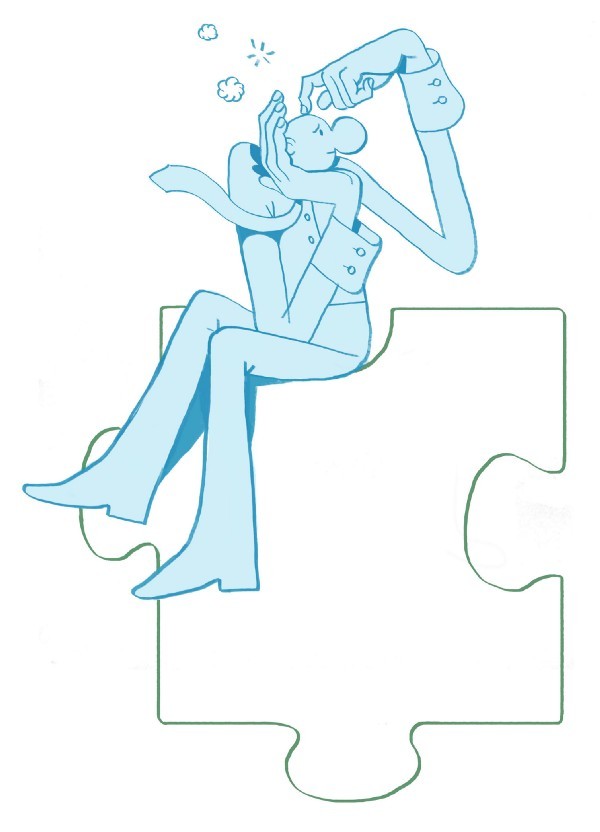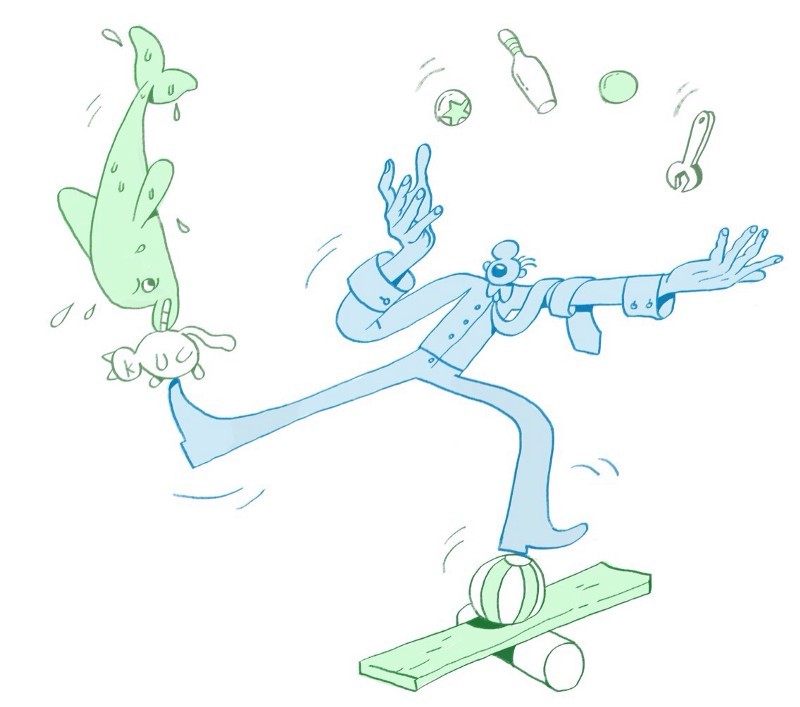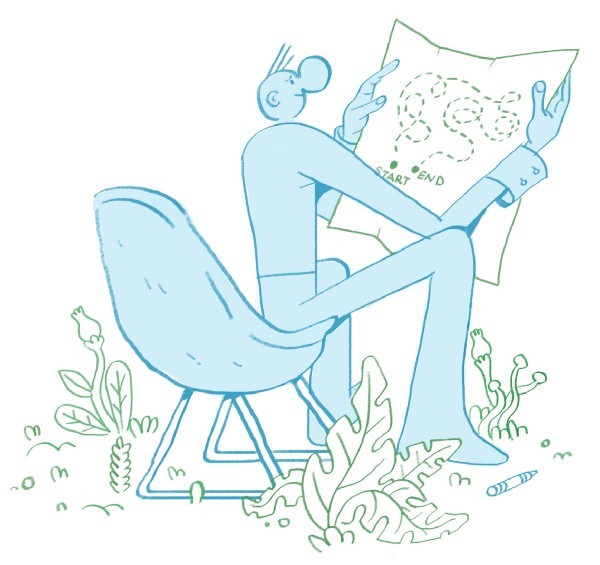How to talk about your side projects
Talk about your side projects whenever you can. At the same time, try to start by posing the problem, then state how you approached it, share the difficulties you encountered, describe the results of your efforts, and end by listing what you would have done differently if you had the opportunity to start over.
I remember coming to my first Facebook interview.
At that moment, I was shaking all the tricks - first of all from excitement, but partly from fear. Fearing that all this will somehow be a rally. Fearing that they confused me with someone. Fearing that I will come in, I will disgrace myself and return home destroyed.
')

At that time, my career was 90% of work in the field of online marketing. I applied for the position of product designer, but in the portfolio I had solid email marketing, copywriting and SEO. Of course, they will expose me as a deceiver and drive me away, how can you not tremble at the sensation of an impending catastrophe?
Of course, I was not driven. The interview went off without a hitch and I was accepted to the desired position. And I didn’t have to say a word about my official work, which I was engaged in full-time and where I was building a career.
Instead, I talked about the continuous flow of tasks related to the design of products that I worked on for the last ten years late at night and on holidays, about how I planned, developed and promoted my own side projects .
At that time, I did not realize that these projects were ideally superimposed on the duties that I had to perform on Facebook - for me they were “just side projects”. But now I see that it was they who taught me practically everything that was required not only to get a job, but also to succeed in it.
It is a pity that people who do not themselves engage in such projects often refer to them without interest. Side projects are a very fertile topic for conversation. They can say a lot about how you work.
About how you identify and fix problems, how to distribute time, about what happens behind the scenes, which otherwise would have remained hidden from an outsider. And of course, side projects themselves can be very interesting.
But if you only have in your resume, that several internships and a collection of side projects, how to talk about each and - perhaps even more important consideration - how to compare them with the experience of this, with employment, work? How to convince others that this project has value, that it is worth talking about it? And what about interviews, is it worth mentioning side projects?
If it were not for them, I probably would not have become what I became. Here are a few recommendations on how to talk about side projects that I have developed for myself over the years.
In any side project, any problem is solved that either you or someone you know has encountered.
It is from this problem that the project arises. Perhaps the problem was simply that you were bored in the summer and began to look for a way to pump your design skills. Or the fact that when you and your friends tried to plan a meeting on the weekend, there was always some sort of confusion.

Recall everything that preceded the beginning of your work on the project, and think about what you can use as a starting point in your story. Start with the problem that resulted from these events.
So begins any story. Before you unfold the plot, you need to designate the principles of the world order. When you talk about your side project, you should follow the same format. Remember the huge, slowly unfolding text at the beginning of Star Wars and how it creates the basis for the entire film.
Speaking about the project, first of all answer the questions concerning how the world was before it appeared. How did you first encounter a problem? What she hooked you so much that you decided to start working on her resolution? How did you balance this task with your other activities?
Now that it has become clear how you have encountered a problem, you need to talk about how you approached its elimination.
In the narrative, after some possibility has been designated, what is called a “situation” follows. What was the situation while you were still not too far away from the original opportunity offered by the project? Maybe you were overcome by insomnia, because the desire to cope with the problem simply did not give rest? Maybe you began to fall out of reality, thinking about possible ways to solve it?
Did you do any research or immediately rushed to work with your head? Whatever the answer, tell us about this experience. Is this your usual behavior pattern? Did you discuss the problem with someone else? Where did you find inspiration? How did you motivate yourself? What had to donate to allocate time to work on the project?
The way you organize your work says a lot not only about your abilities, but also about your character and motivation. If you immediately rushed to work without testing the ground on the market and not looking at how the proposals from competitors work, what was behind this decision?
In life, it rarely happens that everything goes exactly according to plan. We can get sick and miss a few days of work, underestimate the scale of work, and, on the contrary, our abilities to overestimate or not calculate the impact of our solution on the problem. It does not matter the type of work, nor where and how it is done (on weekends or in the office) - in any case, many difficulties await you.

How you can handle these difficulties can tell a lot to your potential employers.
A story about some of the obstacles you encountered while working on your side-project can show that you can work in conditions far from ideal and cope with stressful situations.
What difficulties did you encounter while working on your project? Have you ever been tormented by doubts about your own abilities or the feasibility of a project as a whole? What were your moments when you wanted to give up? What helped you overcome these feelings? Have you ever felt that you were stumped? How did you manage to leave these doubts and obstacles behind? Did someone help you? If so, what functions did you trust them to continue?
You told about your life before the project, how you were inspired to create it, how you approached the solution of the problem and what difficulties you encountered in the process. Now it's time to present the results of your work.
(It is worth noting that an unfinished project can be talked on par with completed ones. Finished projects demonstrate your ability to complete things, but unfinished projects can tell a lot about you)
What did you end up with? How has the world changed - even if that small part of the world that surrounds you - as a result of your work? What was the solution? Was it as you imagined? What evidence do you have that the state of affairs has somehow changed?
Summarizing everything you said about your project, tell us about the current state of the world, what it has become after you have used your abilities and made efforts to find a solution to the problem. What changed? Did the solution show results? Why do you think so?
The last and probably most important question you should touch: if you could go back in time and start all over again, what would you do differently?
The ability to self-analyze is a key condition for critical thinking and personal growth. Understanding where you made a mistake, and where you succeeded and what, if possible, should be corrected, shows that you know how to objectively evaluate yourself and learn from your own experience.

Have you discovered any tricks for yourself while working on the project? Have you mastered something new or, maybe, can you find in yourself such features that you didn’t even suspect? What could be done to speed up the process or bring more brilliance to the result? How do you think it is possible to apply what you have learned while working with a side project, in future projects or something else more substantial?
A story about side projects can give you a lot. As I have already said, I owe this story exactly to my current position, and I am constantly looking for ways to apply the knowledge I gain at work, in side projects and vice versa.
I remember coming to my first Facebook interview.
At that moment, I was shaking all the tricks - first of all from excitement, but partly from fear. Fearing that all this will somehow be a rally. Fearing that they confused me with someone. Fearing that I will come in, I will disgrace myself and return home destroyed.
')

At that time, my career was 90% of work in the field of online marketing. I applied for the position of product designer, but in the portfolio I had solid email marketing, copywriting and SEO. Of course, they will expose me as a deceiver and drive me away, how can you not tremble at the sensation of an impending catastrophe?
Of course, I was not driven. The interview went off without a hitch and I was accepted to the desired position. And I didn’t have to say a word about my official work, which I was engaged in full-time and where I was building a career.
Instead, I talked about the continuous flow of tasks related to the design of products that I worked on for the last ten years late at night and on holidays, about how I planned, developed and promoted my own side projects .
At that time, I did not realize that these projects were ideally superimposed on the duties that I had to perform on Facebook - for me they were “just side projects”. But now I see that it was they who taught me practically everything that was required not only to get a job, but also to succeed in it.
It is a pity that people who do not themselves engage in such projects often refer to them without interest. Side projects are a very fertile topic for conversation. They can say a lot about how you work.
About how you identify and fix problems, how to distribute time, about what happens behind the scenes, which otherwise would have remained hidden from an outsider. And of course, side projects themselves can be very interesting.
But if you only have in your resume, that several internships and a collection of side projects, how to talk about each and - perhaps even more important consideration - how to compare them with the experience of this, with employment, work? How to convince others that this project has value, that it is worth talking about it? And what about interviews, is it worth mentioning side projects?
If it were not for them, I probably would not have become what I became. Here are a few recommendations on how to talk about side projects that I have developed for myself over the years.
Start by posing a problem.
In any side project, any problem is solved that either you or someone you know has encountered.
It is from this problem that the project arises. Perhaps the problem was simply that you were bored in the summer and began to look for a way to pump your design skills. Or the fact that when you and your friends tried to plan a meeting on the weekend, there was always some sort of confusion.

Recall everything that preceded the beginning of your work on the project, and think about what you can use as a starting point in your story. Start with the problem that resulted from these events.
So begins any story. Before you unfold the plot, you need to designate the principles of the world order. When you talk about your side project, you should follow the same format. Remember the huge, slowly unfolding text at the beginning of Star Wars and how it creates the basis for the entire film.
Speaking about the project, first of all answer the questions concerning how the world was before it appeared. How did you first encounter a problem? What she hooked you so much that you decided to start working on her resolution? How did you balance this task with your other activities?
Describe your approach
Now that it has become clear how you have encountered a problem, you need to talk about how you approached its elimination.
In the narrative, after some possibility has been designated, what is called a “situation” follows. What was the situation while you were still not too far away from the original opportunity offered by the project? Maybe you were overcome by insomnia, because the desire to cope with the problem simply did not give rest? Maybe you began to fall out of reality, thinking about possible ways to solve it?
Did you do any research or immediately rushed to work with your head? Whatever the answer, tell us about this experience. Is this your usual behavior pattern? Did you discuss the problem with someone else? Where did you find inspiration? How did you motivate yourself? What had to donate to allocate time to work on the project?
The way you organize your work says a lot not only about your abilities, but also about your character and motivation. If you immediately rushed to work without testing the ground on the market and not looking at how the proposals from competitors work, what was behind this decision?
Share the difficulties you have encountered
In life, it rarely happens that everything goes exactly according to plan. We can get sick and miss a few days of work, underestimate the scale of work, and, on the contrary, our abilities to overestimate or not calculate the impact of our solution on the problem. It does not matter the type of work, nor where and how it is done (on weekends or in the office) - in any case, many difficulties await you.

How you can handle these difficulties can tell a lot to your potential employers.
A story about some of the obstacles you encountered while working on your side-project can show that you can work in conditions far from ideal and cope with stressful situations.
What difficulties did you encounter while working on your project? Have you ever been tormented by doubts about your own abilities or the feasibility of a project as a whole? What were your moments when you wanted to give up? What helped you overcome these feelings? Have you ever felt that you were stumped? How did you manage to leave these doubts and obstacles behind? Did someone help you? If so, what functions did you trust them to continue?
Finish the results
You told about your life before the project, how you were inspired to create it, how you approached the solution of the problem and what difficulties you encountered in the process. Now it's time to present the results of your work.
(It is worth noting that an unfinished project can be talked on par with completed ones. Finished projects demonstrate your ability to complete things, but unfinished projects can tell a lot about you)
What did you end up with? How has the world changed - even if that small part of the world that surrounds you - as a result of your work? What was the solution? Was it as you imagined? What evidence do you have that the state of affairs has somehow changed?
Summarizing everything you said about your project, tell us about the current state of the world, what it has become after you have used your abilities and made efforts to find a solution to the problem. What changed? Did the solution show results? Why do you think so?
In conclusion, list what you would do differently.
The last and probably most important question you should touch: if you could go back in time and start all over again, what would you do differently?
The ability to self-analyze is a key condition for critical thinking and personal growth. Understanding where you made a mistake, and where you succeeded and what, if possible, should be corrected, shows that you know how to objectively evaluate yourself and learn from your own experience.

Have you discovered any tricks for yourself while working on the project? Have you mastered something new or, maybe, can you find in yourself such features that you didn’t even suspect? What could be done to speed up the process or bring more brilliance to the result? How do you think it is possible to apply what you have learned while working with a side project, in future projects or something else more substantial?
A story about side projects can give you a lot. As I have already said, I owe this story exactly to my current position, and I am constantly looking for ways to apply the knowledge I gain at work, in side projects and vice versa.
Source: https://habr.com/ru/post/323802/
All Articles